
Our Services
We partner with workplaces of all sizes, operating across all industries throughout Adelaide, and also deliver client-direct services
Onsite Physiotherapy Injury Prevention

Our onsite physiotherapy model challenges what many people understand of the profession. We don’t sit in a treatment room waiting for injuries to occur to then focus on trying to make only those clients feel temporary relief from their pain and symptoms. It’s almost the opposite.
We are a proactive mobile service going out to engage with everyone where the real activity happens. This model is incredibly effective at preventing injuries, improving safe practices and behaviours, reducing the impact of injuries, maintaining functional capacity, and building a healthy culture.
Our approach to injury prevention follows the professional sports injury model, where continuous engagement and screening of athletes, followed by immediate intervention whilst maintaining and building capacity all within the same environment allows for ultimate care and optimal performance of your most valuable asset – your people!
Early Intervention Injury Treatment

Whilst our goal is to prevent all injuries, the likelihood is that there will still be some that may occur. When they do, how and when they are managed can have a significant bearing on the outcome of the injury and recovery.
Our service model is based around engagement, education and building self-awareness which leads to early reporting of symptoms and immediate access to professional health services. This allows for timely and effective early intervention assessment, diagnosis, treatment and setting of recovery expectations.
Majority of musculoskeletal injuries are accumulative strains and sprains that gradually build up over time. Our service successfully identifies, triages and manages these niggles at the initial onset with often little or no disruption to work capacity and productivity.
Return to Work and Injury Management

There is strong evidence that timely, supportive, coordinated and appropriate return to work (RTW) rehabilitation is likely to improve pain, function and quality of life amongst injured workers and result in improved health and faster recovery. We have extensive experience working across a wide range of industries and roles.
Our intimate knowledge of job demands and workplace practices, coupled with our clinical skills in understanding injury recovery, rehabilitation and functional capacity make us the perfect partner for your RTW needs.
We are solution focused, committed to timely, open and effective communication, and hold ourselves and other stakeholders accountable to ensure that we achieve safe and sustainable RTW outcomes. We place the injured worker at the centre of their recovery pathway, and provide education and support to build confidence and motivation to empower them.
Work Fitness, Functional Capacity Evaluations and
Pre-Employment Assessments
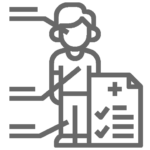
A Functional Capacity Evaluation (FCE) is a series of standardised tests used to provide an independent and objective measure of an individual’s ability to safely perform the physical demands of work.
An FCE is widely used prior to an individual returning to work after a prolonged period away, due to injury or other factors, and can guide work hardening and a graduated return to work schedule. Assessments can also be performed for the purpose of determining the suitability of current or proposed duties (in the instance of people moving sideways into an alternative role), and also in the recruitment process when considering candidates for new employment.
Worksite Assessments, Task Analysis and Safety Assessments
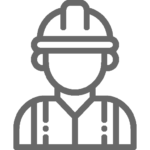
We use our clinical skills, biomechanical expertise and experience with hazard identification and safety controls to conduct independent worksite assessments and task analyses.
These can be performed for an individual to assist with the identification of suitable duties and potential task modification, taking into account the clinical information relating to their injury and functional work capacity. They can also be completed in a non-specific manner, considering the work flow, efficiency and safety for all employees, and may take place in routine safety assessments or as part of a new task set up, modification or redesign. Recommendations, education, training and reporting can be customised based on the needs of each worksite assessment.
Manual Handling, Risk Awareness and
Ergonomic Assessments & Training
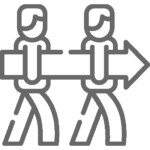
Our approach to manual handling and risk awareness may be different from what you’re used to – and that’s a good thing! The old method of sitting workers down for a slideshow presentation every 12 months just to tell them to “keep their back straight“ is not only boring, but it’s now proven in the evidence to not be effective.
We aim to educate and empower workers to have better body awareness and to understand how and why they move the way that they do. With that knowledge and an understanding of how to assess the risk of certain activities, we see a positive change in the behaviour of workplace safety and manual handling.

By the same nature, our approach to ergonomics and associated injuries is to educate and empower individuals and workplaces with knowledge on safe and effective ergonomic work practices. Ergonomic assessments can be individually tailored following report of an issue, discomfort, pain or injury, or can be non-specific for teams and new workplace set up as part of an injury prevention strategy.
Assessments can be brief workstation observations and office sweeps which have little to no interruption to work activity, through to detailed assessments integrated with education, and also group training sessions. We also perform virtual ergonomic assessments for home workstations. Recommendations, education, training and reporting can be customised based on the needs of each ergonomic assessment.
Activities of Daily Living (ADL) Assessment
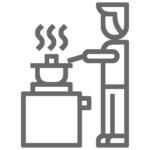
An Activities of Daily Living (ADL) assessment looks at how an individual is functioning in their home environment in relation to personal care, household tasks, recreational and social activities.
This service can be useful for providing recommendations which aim to safely maximise their independence, whilst also supporting their recovery from injury. Our experience in injury management, clinical skills and biomechanical expertise allow us to explore and identify any potential variation in reported and demonstrated functional capacity, which may be attributed to a lack of confidence or fear avoidance. ADLs are also a great way to strategically demonstrate and build capacity for individuals in a safe, comfortable and familiar environment as they recover from injury.
Rehabilitation and Building Capacity

Active management leads to better outcomes, and that’s our philosophy when it comes to rehabilitation.
There is a place for manual therapy in early intervention to restore movement and reduce pain, however we are always focusing on what people can do to safely remain active, and mapping out a plan to build on their capacity to a full recovery. We develop individually tailored functional rehabilitation programs with S.M.A.R.T. goals. We get outcomes because we expect outcomes. We measure our progress to ensure that we remain on track, and proactively navigate around potential barriers to success.
Strength, Conditioning and Performance
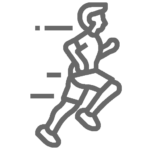
We engage with individuals proactively before they experience any pain or discomfort, to prevent injuries and to keep them in good health.
In the same way, when we treat and rehabilitate someone from an injury, our service doesn’t stop when the pain goes away. We drill down to the root cause to prevent injuries from recurring, but to also improve performance and increase capacity. Our Prehab model (preventative rehabilitation) involves a comprehensive individual assessment to develop a strength and conditioning program tailored to the individuals’ goals, taking into consideration their injury history, fitness, lifestyle and age.
Health & Wellbeing, Motivation, Goal Setting and Cultural Change
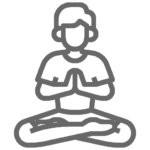
Health & Wellbeing isn’t just about being injury-free or not having a physical pain, it’s about what lies beneath the surface for the individual.
To have purpose, to experience joy, to have resilience to deal with and manage stress, to have motivation & confidence, to have a support network, to have balance in life with activity, rest & relaxation. Our Health & Wellbeing services are tailored to the individual or workplace needs and goals, and can be conducted via private consultation or group programs. Healthy individuals are healthy workers, with evidence to show that addressing biopsychosocial factors and improving employee wellbeing leads to positive outcomes including increased engagement, productivity and retention, and reduced absenteeism and presenteeism.